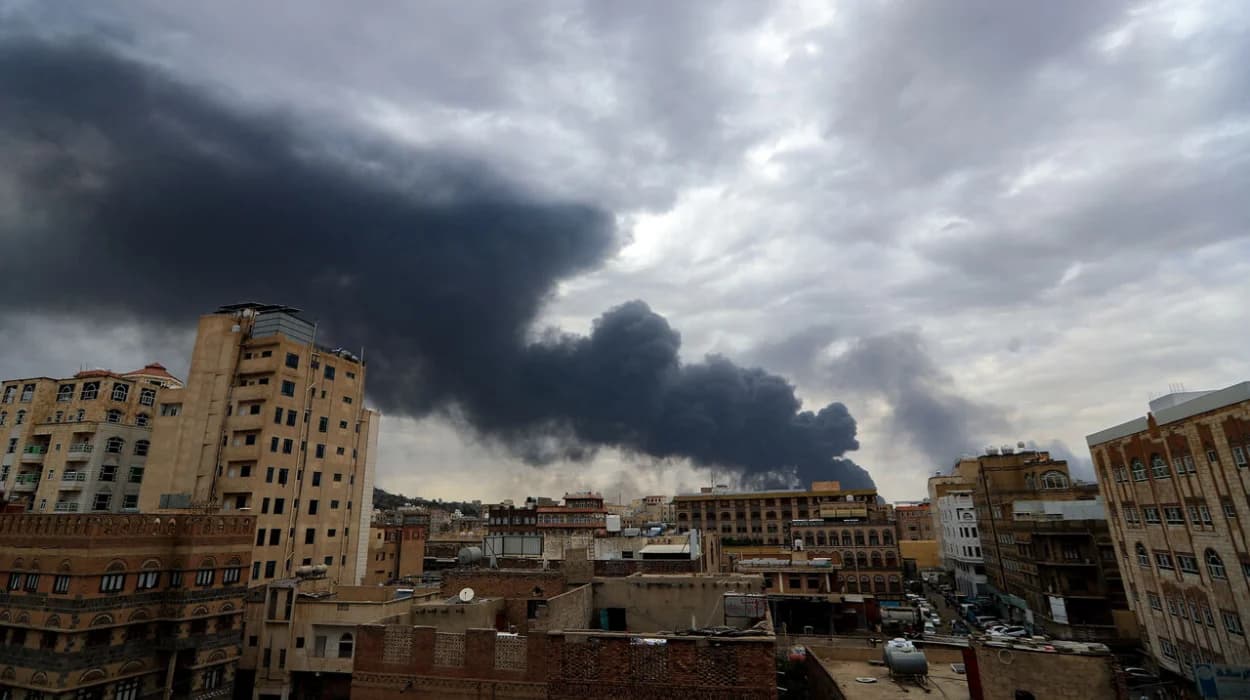Israeli airstrikes in Yemen's capital Sanaa reportedly
killed the Iran-backed Houthi prime minister Ahmed al-Rahawi and targeted
senior Houthi military and political officials, including the defence minister
and chief of staff. The strikes coincided with a gathering of Houthi leaders to
hear a speech by their leader Abdul Malik al-Houthi, although outcomes of some
strikes remain unconfirmed.
Israeli Airstrikes Target Houthi Leadership in Sanaa
As reported by Israeli security sources through The Times of
Israel, the Israeli Air Force launched a highly targeted strike on Thursday, 28
August 2025, aimed at wiping out the top military and political leadership of
the Iran-backed Houthi group in Yemen’s capital Sanaa. The strike was based on
intelligence that approximately 10 senior Houthi ministers, including the
defence minister Mohamed Nasser al-Atifi, and other top officials were gathered
outside Sanaa to hear the weekly planned speech of Houthi leader Abdul Malik
al-Houthi.
According to The Telegraph’s report, Ahmed al-Rahawi, the
Houthi prime minister, was killed in an Israeli strike that hit an apartment in
Sanaa alongside several of his close associates. The prime minister had been
serving in this political role since August 2024, and was considered more a
political figure than a military one.
Details of the Strikes and Intelligence Operation
Israeli intelligence reportedly provided real-time details
of the gathering, enabling a precise strike despite heavy air defences in
Sanaa. Reports from Israel’s Channel 13 cited by The Times of Israel indicated
confidence that the attack succeeded in eliminating the targeted ministers and
officials, although some outcomes are still being assessed.
The strike occurred during Abdul Malik al-Houthi’s
nationally televised speech, which Israeli intelligence monitored closely to
observe whether he was aware of the attack targeting his top leadership.
According to reports, al-Houthi showed no indication that he was aware the
airstrikes were underway while he was addressing the nation.
An unnamed senior official told Channel 12 news that Israeli
forces had been ready to strike the Houthi leadership earlier in the week but
waited for a moment when the senior officials were together.
Casualties and Confirmation of Deaths
The Houthi prime minister, Ahmed al-Rahawi, was reported
killed in an apartment in Sanaa by Yemen's Al-Jumhuriya channel and the Aden
Al-Ghad newspaper, the latter stating that several companions died with him.
Yemeni and Israeli reports suggest that the defence minister
Mohamed al-Atifi and the Chief of Staff Muhammad Abd al-Karim al-Ghamari, who
had survived a previous Israeli strike in June, were also likely killed during
the meeting of senior officials outside Sanaa.
Initial Houthi sources denied any of their members were
targeted and insisted that Israel was attacking civilian targets because of
their support for Gaza, according to The Times of Israel.
Israeli Official Statements
Israeli Defence Minister Israel Katz publicly approved the strikes, stating the Houthis were aware of the consequences of their actions against Israel. Katz said,
"As we warned the Houthis in Yemen, after the Plague of Darkness comes the Plague of the Firstborn. Whoever raises a hand against Israel — his hand will be cut off".
The strikes are seen as Israel's most dramatic military
action in Yemen to date, following an escalation of drone and missile attacks
by the Houthis against Israel since 2023.
Context of the Conflict
The Houthis have intensified their attacks on Israel since
2023, launching missiles and drones over increasing distances. Israel views the
Houthis as an Iranian proxy and a direct security threat.
The strike on Thursday came after multiple Israeli
airstrikes hit Houthi targets in Sanaa earlier that week, including Sunday
strikes prompted by the Houthis firing cluster bomb warheads toward Israel for
the first time.
Despite some uncertainty about the full impact of the
airstrikes on Houthi leadership, Israeli officials are optimistic that the
strikes have significantly disrupted Houthi command structures.
Uncertainty Over Houthi Leader’s Location and Safety
The Houthi leader Abdul Malik al-Houthi is known to avoid
direct exposure, rarely appearing in public or staying long in one spot.
Reports indicate he often gives speeches remotely and is believed to be hiding
in mountainous caves.
Though the senior officials were gathered to watch his
address, the leader himself was not at the strike location, which complicated
efforts to directly target him.
Reaction and Impact
The airstrikes triggered intense debate and have escalated
tensions in the region, with multiple media outlets describing the Israel
strike as a significant blow to the Houthi leadership’s morale and command
capabilities.
The strikes in Yemen reflect a broader regional proxy
conflict involving Iran and Israel, where Yemen’s Houthis serve as a critical
Iranian ally.
The Israeli strikes on Yemen’s capital Sanaa have reportedly
killed the Houthi prime minister Ahmed al-Rahawi and possibly other senior
officials, signifying a major escalation in the conflict between Israel and the
Iran-backed Houthis. While some casualties and outcomes await confirmation, the
strikes demonstrate Israel’s intention to disrupt the Houthis’ command and
control amid an ongoing war marked by escalating cross-border attacks. Israeli
officials have framed the strike as a necessary response to Houthi aggression,
marking a new phase in the regional conflict.
